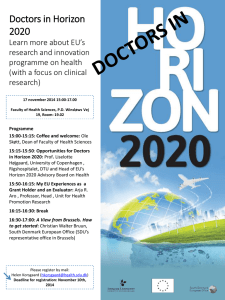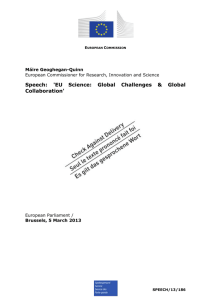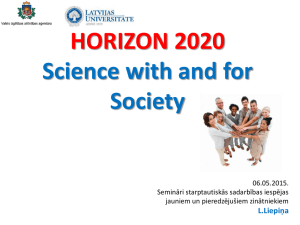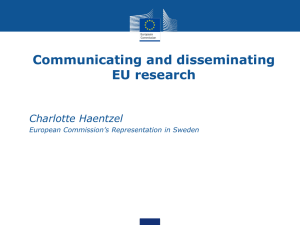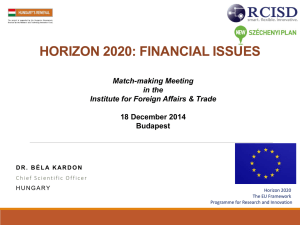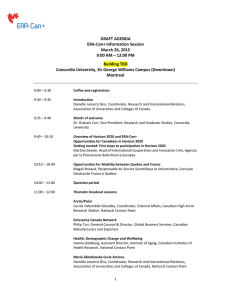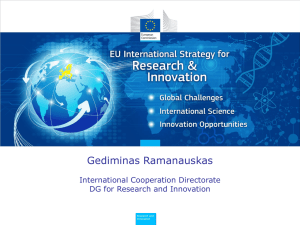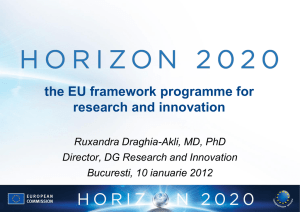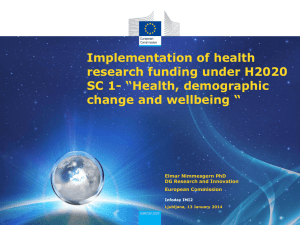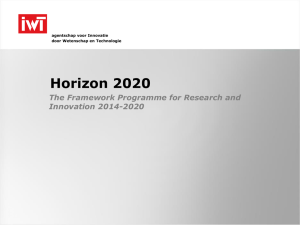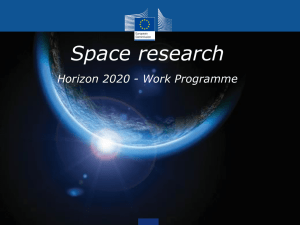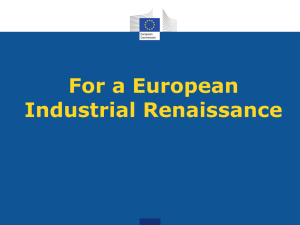DOC - Europa
advertisement
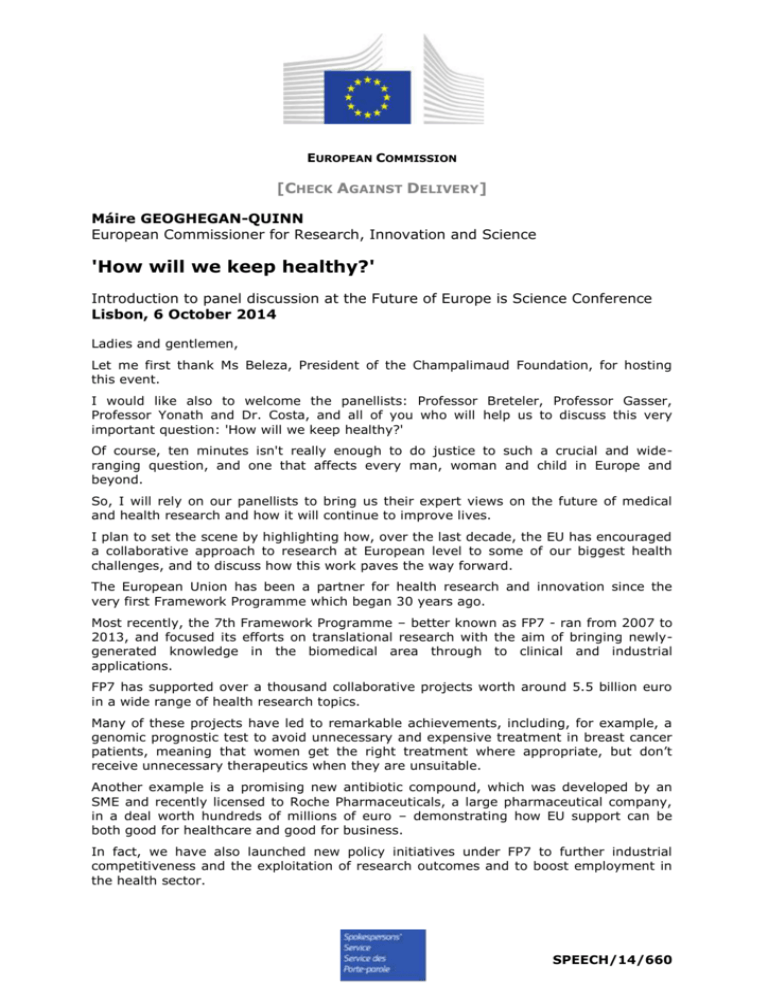
EUROPEAN COMMISSION [CHECK AGAINST DELIVERY] Máire GEOGHEGAN-QUINN European Commissioner for Research, Innovation and Science 'How will we keep healthy?' Introduction to panel discussion at the Future of Europe is Science Conference Lisbon, 6 October 2014 Ladies and gentlemen, Let me first thank Ms Beleza, President of the Champalimaud Foundation, for hosting this event. I would like also to welcome the panellists: Professor Breteler, Professor Gasser, Professor Yonath and Dr. Costa, and all of you who will help us to discuss this very important question: 'How will we keep healthy?' Of course, ten minutes isn't really enough to do justice to such a crucial and wideranging question, and one that affects every man, woman and child in Europe and beyond. So, I will rely on our panellists to bring us their expert views on the future of medical and health research and how it will continue to improve lives. I plan to set the scene by highlighting how, over the last decade, the EU has encouraged a collaborative approach to research at European level to some of our biggest health challenges, and to discuss how this work paves the way forward. The European Union has been a partner for health research and innovation since the very first Framework Programme which began 30 years ago. Most recently, the 7th Framework Programme – better known as FP7 - ran from 2007 to 2013, and focused its efforts on translational research with the aim of bringing newlygenerated knowledge in the biomedical area through to clinical and industrial applications. FP7 has supported over a thousand collaborative projects worth around 5.5 billion euro in a wide range of health research topics. Many of these projects have led to remarkable achievements, including, for example, a genomic prognostic test to avoid unnecessary and expensive treatment in breast cancer patients, meaning that women get the right treatment where appropriate, but don’t receive unnecessary therapeutics when they are unsuitable. Another example is a promising new antibiotic compound, which was developed by an SME and recently licensed to Roche Pharmaceuticals, a large pharmaceutical company, in a deal worth hundreds of millions of euro – demonstrating how EU support can be both good for healthcare and good for business. In fact, we have also launched new policy initiatives under FP7 to further industrial competitiveness and the exploitation of research outcomes and to boost employment in the health sector. SPEECH/14/660 FP7 was a very successful stepping stone on the way to the new, challenge-based approach at European level under Horizon 2020, the new Framework Programme for research which began earlier this year and will continue until 2020. To my mind, the most important reason for collaborating on health research at European level is to benefit from the critical mass of excellent scientists and resources necessary to tackle huge and expensive challenges. We can only win the fights against antimicrobial resistance, rare diseases, obesity and neurodegenerative diseases if we pool knowledge across research disciplines, across the public and private sectors, and across borders. Europe leads the way with its bold, ambitious approach – take for example the Innovative Medicines Initiative (IMI), the public-private partnership between the EU and the European pharmaceutical industry, which jointly funds research to accelerate the development of new medicines and improve industrial competitiveness. The huge cost of developing new drugs demands this kind of creative collaboration. Working together at EU level also means that we can avoid wasteful duplication. The Joint Programming Initiative on Neurodegenerative Diseases was the first of its kind, piloting a new, strategic coordination of Member States' own research agendas. And, since most health challenges are global in nature, it pays for Europe to work with international partners. A good example of global cooperation is the European and Developing Countries Clinical Trials Partnership (or EDCTP), which is a joint initiative that unites experts from 16 European countries with 30 sub-Saharan African countries. It really is a cornerstone of the EU's global engagement in health research. It has already funded 60 clinical trials in Africa, concentrating on HIV/AIDS, Malaria and Tuberculosis. I was privileged to see the work of the Partnership myself in South Africa, two years ago, and I was deeply impressed by the quality of the work and cooperation I saw on the ground there. So much has been achieved in the last decade. Indeed, the long history of medical research is a story of success upon success, particularly over the last century. People have never lived as long or as well. But the story is not all rosy – we are beginning to see downsides to all this progress. Sophisticated diagnostic methods and therapies, and the fantastic improvements in health and longevity have all contributed to mushrooming health costs. As we all know, Europe is getting older. By 2060, the over-65s will have doubled in number and we will have three times as many people over 80. While this is great news, it brings challenges like the inevitable increase in the incidence of neurodegenerative diseases. At the same time, cancer, cardiovascular diseases, mental illness and chronic diseases such as diabetes are posing a huge burden in terms of human suffering and in terms of the strain on our health services. New problems are arising and some old ones are re-emerging. We are seeing worrying incidences of antibiotic resistance, the resurgence of tuberculosis, and many lifestylerelated disorders. So, how can we stay healthy in the face of all these challenges? Complex as this question is, one thing is clear: research and innovation are at the root of the answer. 2 Research improves our understanding of health, disease and ageing, and innovation translates this knowledge into effective products and services for the benefit of all. And what is healthy for people in Europe can also be good for our economy. The new products and technologies developed to keep us well can also create new opportunities for innovative European companies. Innovation in our health services can ensure the latest treatments reach those who need them, while also making the best use of scarce resources. In fact, it's no exaggeration to say that the health sector is at the vanguard of creative new research and innovation policies at European level. I already mentioned the Joint Programming Initiative on Neurodegenerative Diseases and IMI, the first initiatives of their kind, and we continue to launch new, innovative ways to tackle health challenges. One of the first actions under the Innovation Union flagship was the launch of the first of five European Innovation Partnerships, on Active and Healthy Ageing. The Partnership pilots a new way of working with innovation across sectors to achieve a clearly defined goal. In this case, policymakers, health services, business and universities work together to translate innovative ideas into tangible products and services that respond to the concrete needs of older people. The target is to add two healthy life years to the average lifespan of Europeans by 2020. 2020 is also the end-date of Horizon 2020, the EU's 80 billion euro research and innovation programme launched last year. Building on the seven Framework Programmes for Research that preceded it, Horizon 2020 ushers in many improvements and reforms to how we support research and innovation at European level. Two of the most important are the provision of support at every stage, from frontier research to new products and services, and an approach that focuses on societal challenges rather than scientific disciplines. These twin novelties will serve health research and innovation very well. With 1 billion euro per year, the societal challenge 'Health, Demographic Change and Wellbeing' is the largest in terms of budget. This will enable us to support hundreds of collaborative research projects and other flagship programmes like the 2nd Innovative Medicines Initiative and the 2nd European and Developing Countries Clinical Trials Partnership. Personalised healthcare and healthy ageing are the two focal points of this societal challenge, with the goals of providing the right prediction, prevention and treatment strategies to the right person at the right time. But our responses to health challenges cannot only be technological. As we are dealing with people and their needs; social innovation is equally important. This is why the social sciences and humanities have been fully integrated into our research agenda for the first time. Research funded within the health challenge will also contribute to our understanding of how diet, lifestyle and environmental factors can affect health and wellbeing, and reduce healthcare costs and inequalities in the long-term. Ensuring food security will be another major factor in keeping us healthy, and this goes beyond merely ensuring a sufficient supply. It also concerns access to safe and nutritious food. The challenge is how to meet consumers' needs and preferences while minimising negative impacts on health and the environment. Horizon 2020 supports research and 3 innovation in this area under the challenge on Food Security, Agriculture and the Bioeconomy. And creating innovative eco-solutions for healthy and green societies also needs to be on our research and innovation agenda, not just for the benefit of the environment, but also for their positive effect on people's health and wellbeing. Research on this is funded under another of Horizon 2020's challenges on Climate Action, the Environment, Resource Efficiency and Raw Materials. Another important development is the systematic use of foresight as a tool to help set Horizon 2020's strategic priorities. The Commission has launched several foresight actions to identify the key future research and innovation challenges, cutting across different fields, including at the interface between health, the environment and the bioeconomy. I hope that these examples of how EU-funded research and innovation can help us stay healthy are useful for today’s discussion. Of course, this is only one piece of the puzzle, so I look forward to hearing from our expert guests on how they see science, technology and innovation contributing to better health and wellbeing for everyone in Europe. With this, I thank you for your attention and I give the floor to Ms Beleza. 4
